Is there a market for Android apps?
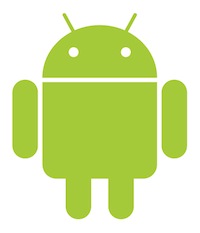
If you are developing and selling applications for the iPhone, then you may be thinking about the question: “Should I make an Android version?”
Is there really a market for Android apps?
In general, yes, there is, but its size may be smaller than you think.
')
In any case, if you are trying to assess the potential market for the Android version of an existing iOS application, do not limit yourself to studying the number of Android devices sold. And do not even think about judging the market by the number of requests from users. Two words: an active minority .
The average owner of an Android device is a beast, very different from the typical iPhone owner, and has a completely different appetite for apps.
Let's take a look at recent market research and follow my data on Collectorz.com apps for iPhone, iPad and Android.
Android market share
In early November, Gartner presented the results of a study on the smartphone market in the 3rd quarter of 2010:
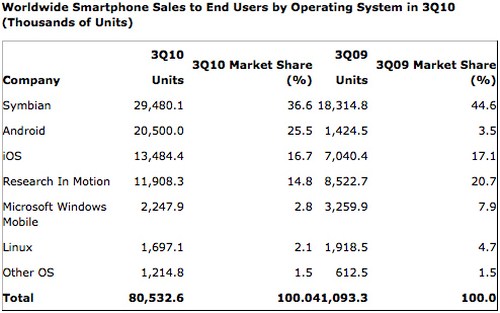
- iOS market share: 16.7%
- Android market share: 25.5%
That is, in the third quarter, the number of Android devices sold is about 50% more than the number of iPhones sold. Of course, a significant number of iPhones were sold earlier, but, nevertheless, everything looks as if Android is gaining momentum, and fast.
Collectorz.com data
I'll tell you about my experience in selling applications for the iPhone, iPad and Android.
Poll results
In July, we conducted a survey on mobile devices in order to find out whether it makes sense for us to start developing mobile applications for platforms other than iOS (iPhone and iPad).
Here are the answers to the first question: “What mobile device (s) do you have?”.
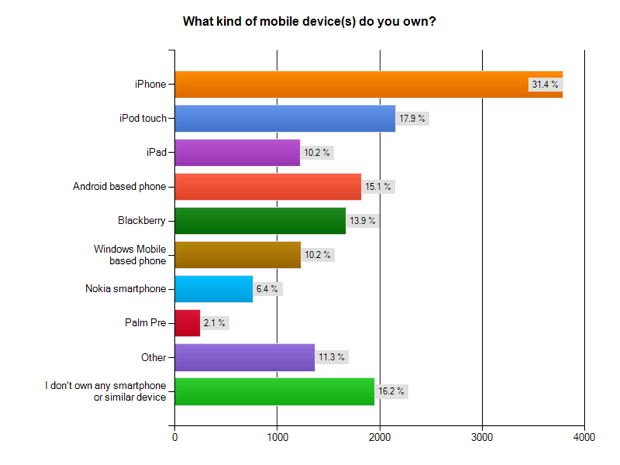
Even then, I had a feeling that Android users are somewhat different from fans of Apple products, so the second question was: "How many applications have you purchased for your device?". Here are the results for the iPhone and Android:
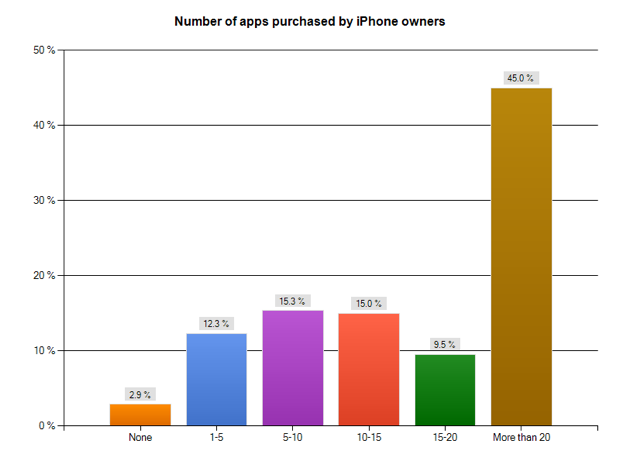
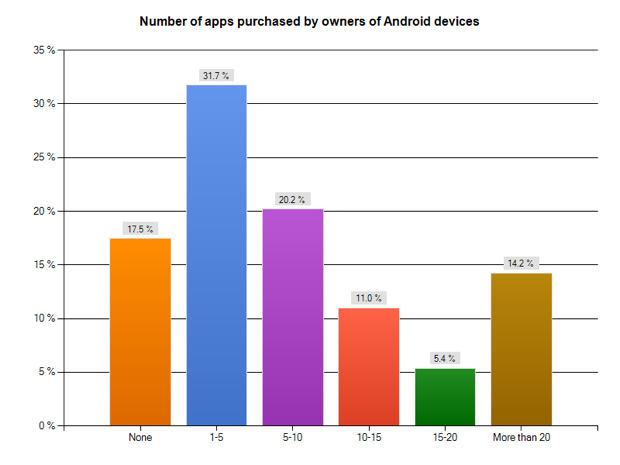
Important data from the July survey results:
- iPhones are twice as large as Android phones.
- Androids are about 50% larger than iPads.
- IPhone users buy more apps than Android users.
Android vs. iPad: New Clubs
So, we decided to start developing applications for iPad and Android. When we were close to completion, we opened the Club of new products for each platform. (The club of new products is our name for accessing applications that have not yet been released, members of the club can get more information about future applications, see screenshots and receive news on how things are progressing.)
After a couple of weeks, the number of Club members settled down at the following values:
- Club for Android: 3,286 members
- IPad Club: 3,537 members
Interestingly, although 50% more Collectorz.com users own Android devices, iPad users have shown more interest in getting the Collectorz.com application to their device.
Android vs. iPad: First Week Sales
Fast forward a couple of months, to the beginning of October, when we released CLZ Movies, our first application for iPad and Android. We actively promoted both versions among the distinguished members of the Clubs of new products and all owners of the Movie Collector (desktop program - comment of the translator) . Here are the first week sales data for both versions:
- CLZ Movies for Android: 430 sales
- CLZ Movies HD for iPad: 895 sales
The number of versions sold for the iPad is more than twice as high.
iPhone vs. Android vs. iPad: Weekly Sales
Now let's try to compare sales for all three mobile platforms in a regular week, that is, a week when sales are not affected by the recent release, mailing, etc. Here are my data for a quiet week in November:
- CLZ Movies for iPhone: 79 sales
- CLZ Movies HD for iPad: 97 Sales
- CLZ Movies for Android: 46 sales
Please note that the versions for iPad and Android are still fairly new and can be purchased by existing Collectorz.com customers. That is, there may be a residual reaction to the recent release. At the same time, the iPhone version was released in May 2009 and has not been updated since December 2009 ...
Nevertheless, the iPhone version is sold at 71% better than the Android version. The iPad version is generally twice as good.
Why do Android users buy less apps?
What's happening? Why is the average Android user much less inclined to buy apps for his smartphone?
One reason I heard at the very beginning of the development of Android. Allegedly, Android users are more technically savvy, soaked in the spirit of Linux, who love open-source, confident that Android applications should be free, like the operating system itself. But I do not think that this is the cause of the effect that I see among my public.
My guess: the Android operating system is now being used in an increasing number of devices, including low-end smartphones. Nowadays, Android phones are sold to many users who may not need a smartphone, or at least do not need apps for it. Such users simply bought a new phone (or got it for free with a contract) in which, as it happened , the Android operating system. And they were taken into account when calculating the market share.
An iPhone user is someone who deliberately chose an iPhone because of its capabilities, cool interface, application availability, and so on. Completely different beast.
So ... is it worth making an Android version of your iPhone application?
All of the above may look as if I regret the time and money spent on developing Android versions of my iPhone applications. But it is not. Our Android versions are selling well and generate a nice extra income every month. And if you look at the statistics from Gartner, the income is likely to only increase. The time spent on development is justified.
But I have to admit that I am a little disappointed. Based on the amount of news about Android and a large number of requests (read: requirements) from users, I just expected more sales.
I can not predict what happens from porting your iPhone applications to Android. It completely depends on your public (business or home users), the type of application and whether you sell the applications as add-ons for existing users or as separate applications. My audience consists of home users. My applications are niche and I sell them only to existing users, which means my independence from the rating in the App Store.
In the business field, Android owners can be as greedy for applications as the average iPhone owner. And for individual applications, the probability of being noticed in the Android Marketplace may be higher than in the Apple App Store (fewer applications). A lot of things affect.
In any case, I hope that my data will give you some insight into the real market for Android applications, and not the market for Android devices .
Source: https://habr.com/ru/post/109588/
All Articles